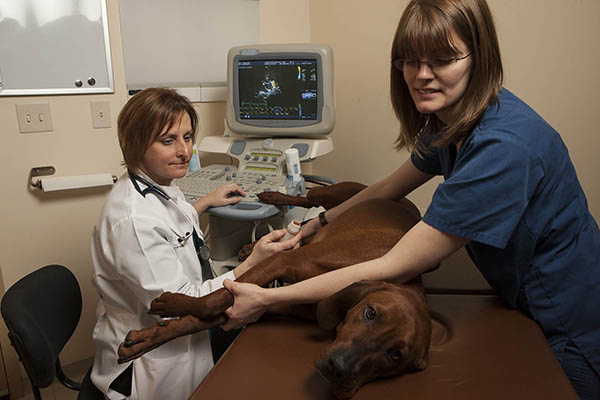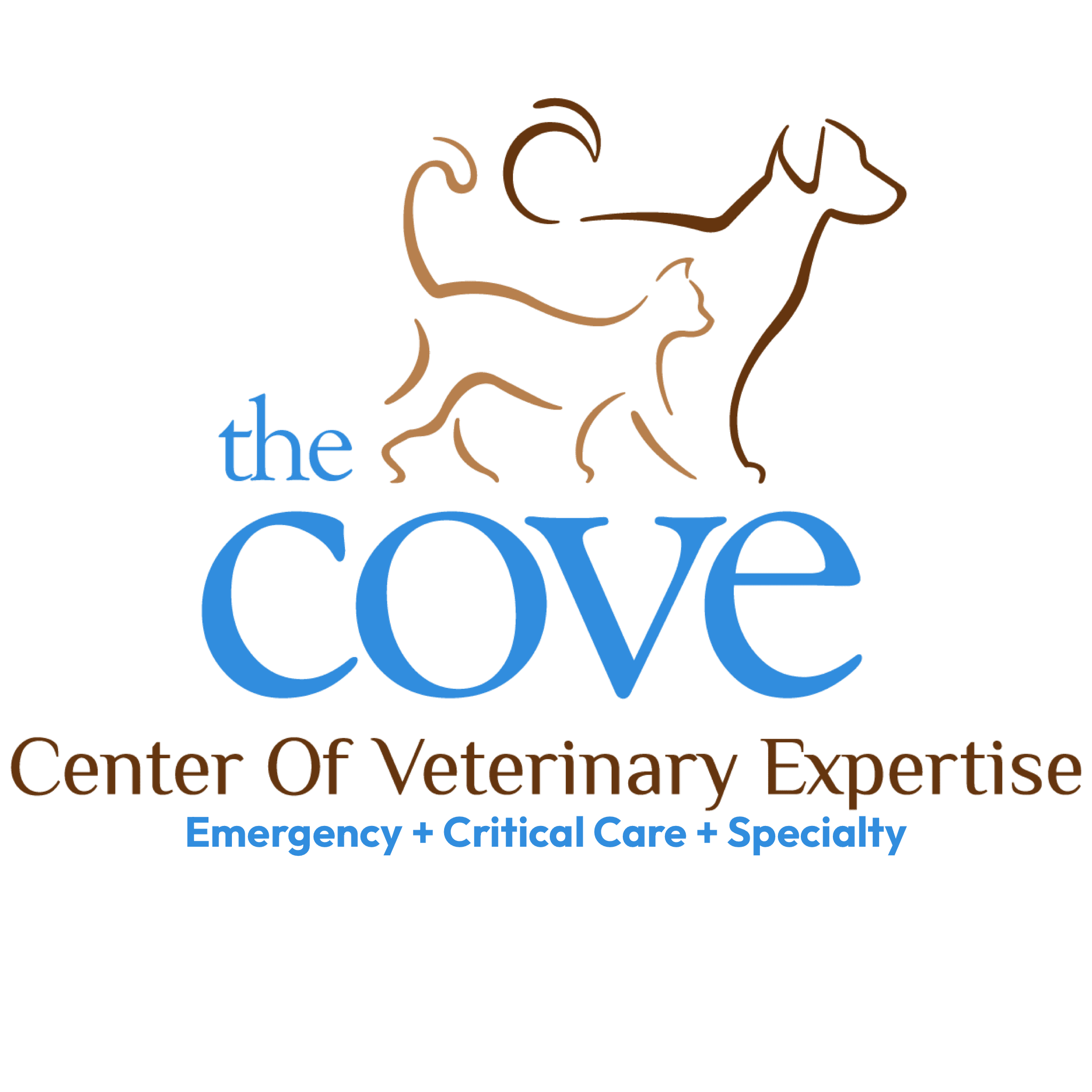[et_pb_section admin_label=”section”]
[et_pb_row admin_label=”row”]
[et_pb_column type=”4_4″]
[et_pb_text admin_label=”Text”]
February is designated as American Heart Month – a perfect time to talk about heart disease in pets. Here at The COVE, we are dedicated to educating our pet families on the signs, symptoms, and treatment options for dogs, cats, and other domestic animals with heart disease.
What Causes Heart Disease in a Dog or Cat?
There are essentially two categories of heart disease in dogs and cats: congenital and acquired. These diseases can affect the heart muscle, heart valves, electrical conduction of the heart, or blood vessels that carry blood from the heart to the rest of the body.
Congenital heart conditions are diseases that are present at birth. Certain breeds are more prone to congenital heart disease, but any pet may be born with a heart defect. Some patients develop symptoms early in life, and others can live for years before the defect causes a problem.
Acquired heart conditions develop as a pet matures or ages. Most heart disease has a genetic basis – the tendency to develop cardiac disease comes from a pet’s bloodline. Other health conditions can affect the heart, including high blood pressure, an over or underactive thyroid, adrenal glands, toxins, infections, and, last but not least, heartworm disease.
What are the Signs and Symptoms of Heart Disease in Pets?
Heart disease can be present for months to years before symptoms occur. That is why annual physical exams with your primary care veterinarian are essential in your pet’s cardiac and overall health and well-being. Here are the most common symptoms of heart disease in cats and dogs:
(Symptoms are listed in alphabetical order and not in order of severity or importance)
- Abnormal behaviors – cats, in particular, are very good at hiding illness. Symptoms as subtle as hiding in strange places or not eating can be signs of heart disease.
- Cough – many dogs with heart disease will cough due to an enlarged heart pressing on the windpipe or fluid accumulation in the lungs.
- Fainting or collapsing – cardiac pet patients may collapse due to reduced blood flow to the brain, either as the heart fails to effectively pump blood and oxygen to the brain or if an abnormal heart rhythm is present. Unfortunately, some patients can pass away suddenly.
- Respiratory rate – an increase or change in your pet’s sleeping and/or resting respiratory rate or effort is noted during the progression of heart disease and maybe one of the earliest signs of congestive heart failure.
- Sudden paralysis – blood clots can form within the heart and then dislodge and be propelled to other parts of the body, often between the rear legs. This is more common in cats.
- Weakness or exercise intolerance – if the heart is unable to effectively and efficiently deliver blood to the lungs and muscles, your pet may not be able to accomplish its normal level of activity.
Animals suffering from heart disease can also experience congestive heart failure (CHF). If the heart is unable to efficiently pump blood forward to the vital organs, the pressure will build up, and fluid will begin to leak from the blood vessels into the lungs, around the lungs, or into the abdomen. Patients may experience shortness of breath, increased breathing rate, or a distended abdomen.
Because many of the symptoms can be due to other health problems, it is essential that you call your primary care veterinarian immediately if your pet experiences any of the above.
How is Heart Disease in Cats and Dogs Diagnosed?
For an accurate diagnosis, your primary care veterinarian will first examine your pet. Your doctor will complete a thorough physical exam, including auscultation (listening to the internal sounds of the body) with a stethoscope. Auscultation can detect abnormal heart sounds (heart murmur) or irregular heartbeats (arrhythmia). Further tests may be performed in the veterinary office, including measurement of blood pressure, electrocardiogram, chest radiographs (X-rays), or bloodwork. For advanced cardiac issues, your veterinarian may recommend a referral to a board-certified veterinary cardiologist.
There are just over 300 veterinarians who have earned board certification in the specialty of cardiology. The COVE’s Merrilee T. Small, DVM, DACVIM (Cardiology), is one of these highly skilled veterinary specialists, and she has earned a special place in the hearts of countless pet owners throughout the region.
For pets referred to The COVE’s Cardiology Department, Dr. Small offers a more comprehensive cardiovascular examination and advanced diagnostic tests, such as echocardiography (ultrasound of the heart), invasive blood pressure monitoring, continuous electrocardiography, or additional blood tests. Once the results are available, a personalized treatment and monitoring plan will be established.

What is the Treatment for Heart Disease in Pets?
Although treatments cannot reverse heart disease, a pet diagnosed with this condition can live a relatively normal and healthy life. It can typically be managed for months to years with medication and careful monitoring. Not all heart conditions require treatment at the time of diagnosis. Often periodic rechecks are recommended until heart medication is necessary.
Early Detection and Prevention
Unfortunately, heart disease cannot always be prevented due to genetics. However, the earlier heart disease is detected, the more likely your pet can remain happy and comfortable for as long as possible. You can reduce your pet’s risk by scheduling routine exams with your primary care veterinarian and giving your pet heartworm preventative medication all year round – including cats. Regular exercise and a healthy diet can keep your furry loved one’s heart strong and healthy.
We hope you find this information helpful and insightful. Please remember that, if your pet needs advanced cardiology care, Dr. Small and her team are here to help. For additional questions, you can reach The COVE at 757-935-9111. And remember, in an emergency, we are open 24/7, and no appointment is ever needed.
[/et_pb_text]
[/et_pb_column]
[/et_pb_row]
[/et_pb_section]
About Us
The COVE’s veterinarians and staff wholeheartedly embrace the core values of community, collaboration, commitment, compassion, and integrity. This focus ensures that pets, the people who love them, and their primary care veterinarians have as positive and affirming a healthcare experience as possible, regardless of the circumstances that bring us all together.
